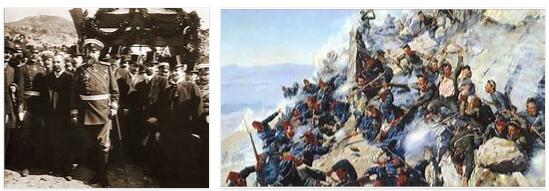Bulgaria History: From the 4th Century to Independence
The Bulgarian hordes appeared as early as the 10th century. VI in the area crossed by the lower course of the Danube, but it was only with the khān Asparuch that they settled definitively in the territories between the river and the Balkans. After defeating him, Asparuch forced the Byzantine emperor Constantine IV Pogonato to recognize (679) the right of proto-bulgarians to remain in the occupied territories. Although of Tartar origin, these tribes joined with relative ease and speed the indigenous Slavic population giving rise to the Bulgarians. In the sec. IX the new Balkan state had by now consolidated: the Bulgarian khān believed to be strong enough to be able to clash with the empire and tried to extend their territories to the S. The fate of the struggle, which lasted for two centuries, initially turned in favor of the Bulgarians, who, under the leadership of the khān Krum (802-814), defeated the Byzantines (811), conquered part of Thrace and vast areas of Macedonia coming to besiege Constantinople. Krum’s successors extended their power to all of Macedonia and most of Albania, until Boris I (852-889) consolidated the conquests made and strengthened the institutions of the state. The process of fusion between the Slavic and Proto-Bulgarian populations received a definitive impulse: the language diluted the original Tartar characteristics in Slavic, the Cyrillic characters, derived from Greek, were adopted, and the conversion to Christianity was decided: elements that contributed considerably to the formation of a real Bulgarian nation.
It was Simeon (893-927) who, in an attempt to conquer Constantinople, waged war on the empire, managing to take possession of Adrianople and to besiege the Byzantine capital. The Byzantines were defeated and Simeon assumed the title of Tsar of the Bulgars. The very strong state that Simeone had achieved by governing wisely, however, gradually weakened between wars with neighboring populations and rebellions that developed in the subjugated territories. The Byzantines thus managed to wrest a large part of its territories from Tsar Boris II (969-972) and in 1014 the Emperor Basil II, known as the Bulgaroctonus, definitively defeated Tsar Samuel: within five years Bulgaria was completely conquered and absorbed. in the empire. This state of awe lasted until 1186, when the Bulgarians revolted and succeeded with Tsar Kalojan (1197-1207) to rebuild their state (1197) which experienced a new period of splendor under the reign of Ivan Asen II (1218-41), whose death was followed by a new, progressive decline characterized by continuous internal struggles. Under these conditions the Bulgarians were repeatedly defeated by the empire and the kingdom of the Serbs, until the last Tsar Ivan Šišman (1371-91) had to bow in the face of the Turkish invasion.
In the last years of the century. XIV, according to Petsinclude, Bulgaria definitively lost its independence and was annexed to the Ottoman Empire. The centuries-old Ottoman domination (1393-1878) became synonymous with economic depression and brutal social oppression for the Bulgarian people, who had no national intermediate force outside the Orthodox clergy. Only towards the end of the eighteenth century the weakening of the Ottoman Empire and the repercussions of the French Revolution they opened up prospects of rebirth to the Bulgarians. A relative national awakening, profiled as a faded reflection of nineteenth-century liberalism, matured as a result of the institution of the autocephalous Orthodox exarchate, decided in 1870 by the Ottoman government to isolate the Bulgarian Church from the Hellenic one and reduce the latter’s political influence. In concomitance with the Bosnian uprising, which preceded the outbreak of the Russo-Turkish war of 1877, national revolts also took place in Bulgaria; Bulgarian nationalism seemed to come to complete realization with the establishment of Greater Bulgaria, foreseen by the Russo-Turkish treaty of Santo Stefano (March 3, 1878): the new autonomous principality, actually born under the protection of Russia which had presented itself as a galvanizer of Slavic national ideals, it should have included Bulgaria proper, Macedonia (excluding Thessaloniki) and Thrace (excluding Adrianople). The next one Congress of Berlin, with the treaty of July 13, 1878, demolished the great Russian design (see Balkan Peninsulaand Question of the East) establishing a small Bulgarian principality N of the Rhodopes, autonomous under the Porte, and the autonomous Ottoman province of eastern Rumelia; Macedonia and Thrace remained in the Ottoman Empire. Alexander of Battenberg was elected prince of Bulgaria in 1879; in 1885 the union of Bulgaria and eastern Rumelia caused a diplomatic crisis and a very short Serbo-Bulgarian war, concluded by the Peace of Bucharest (1886). In the same year, Alexander, who had tried to set up a policy free from Russia, was forced to abdicate. The successor, Ferdinand of Saxe-Coburg managed to gradually orient Bulgaria towards Vienna. In 1908, taking advantage of the crisis for the annexation of Bosnia and Herzegovina, the independence of the Kingdom of Bulgaria was proclaimed.. The dream of Greater Bulgaria engaged the new kingdom in the two Balkan wars (1912-13): from the first, fought alongside Greece and Serbia against the Turks, Bulgaria drew large territorial advantages, but lost a few months later with the second Balkan war, fought against all the other countries in the region. Eventually Sofia retained a modest portion of Macedonia, losing southern Dobruja to Romania instead (Peace of Bucharest, 1913). Participation in the World War I alongside the Central Empires, wanted in opposition to Serbia and Greece and started with military successes, ended disastrously with other territorial losses and particularly with the loss of access to the Aegean (Peace of Neuilly of 27 November 1919).



